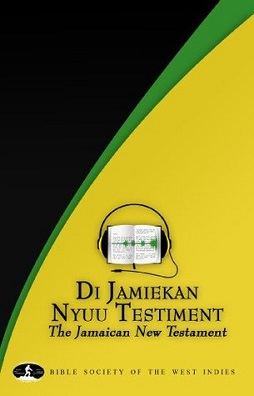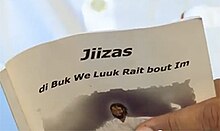Jamaican English, including Jamaican Standard English, is a variety of English native to Jamaica and is the official language of the country. A distinction exists between Jamaican English and Jamaican Patois, though not entirely a sharp distinction so much as a gradual continuum between two extremes. Jamaican English tends to follow British English spelling conventions.

Gullah is a creole language spoken by the Gullah people, an African American population living in coastal regions of South Carolina and Georgia as well as extreme northeastern Florida and the extreme southeast of North Carolina.
Caribbean English is a set of dialects of the English language which are spoken in the Caribbean and most countries on the Caribbean coasts of Central America and South America. Caribbean English is influenced by, but is distinct to the English-based creole languages spoken in the region. Though dialects of Caribbean English vary structurally and phonetically across the region, all are primarily derived from British English and West African languages. In some countries with a plurality Indian population, such as Trinidad and Tobago and Guyana, Caribbean English has further been influenced by Hindustani and other South Asian languages.

Torres Strait Creole, also known as Torres Strait Pidgin, Brokan/Broken, Cape York Creole, Lockhart Creole, Kriol, Papuan, Broken English, Blaikman, Big Thap, Pizin, and Ailan Tok, is an English-based creole language spoken on several Torres Strait Islands of Queensland, Australia; Northern Cape York; and south-western coastal Papua New Guinea (PNG).
Jamaican culture consists of the religion, norms, values, and lifestyle that define the people of Jamaica. The culture is mixed, with an ethnically diverse society, stemming from a history of inhabitants beginning with the original inhabitants of Jamaica. The Spaniards originally brought slavery to Jamaica. Then they were overthrown by the English. Jamaica later gained emancipation on 1 August 1838, and independence from the British on 6 August 1962. Black slaves became the dominant cultural force as they suffered and resisted the harsh conditions of forced labour. After the abolition of slavery, Chinese and Indian migrants were transported to the island as indentured workers, bringing with them ideas from their country.

Bermudian English is a regional dialect of English found in Bermuda, a British overseas territory in the Western Atlantic. Standard English is used in professional settings and in writing, while vernacular Bermudian English is spoken on more casual occasions. The Bermudian dialect began to develop following settlement in the early 17th century and retains traits of Elizabethan English.

Jamaican Patois is an English-based creole language with West African, Taíno, Irish, Scots, Scottish Gaelic, Spanish, Hindustani, Portuguese, Chinese, and German influences, spoken primarily in Jamaica and among the Jamaican diaspora. Words or slang from Jamaican Patois can be heard in other Caribbean countries, the United Kingdom, New York City and Miami in the United States, and Toronto, Canada. The majority of non-English words in Patois derive from the West African Akan language. It is spoken by the majority of Jamaicans as a native language.
Nigerian Pidgin, also known as Naijá in scholarship, is an English-based creole language spoken as a lingua franca across Nigeria. The language is sometimes referred to as Pijin or Vernacular. It can be spoken as a pidgin, a creole, dialect or a decreolised acrolect by different speakers, who may switch between these forms depending on the social setting. In the 2010s, a common orthography was developed for Pidgin which has been gaining significant popularity in giving the language a harmonized writing system.

The Sierra Leonean Creole or Krio is an English-based creole language that is lingua franca and de facto national language spoken throughout the West African nation of Sierra Leone. Krio is spoken by 96 percent of the country's population, and it unites the different ethnic groups in the country, especially in their trade and social interaction with each other. Krio is the primary language of communication among Sierra Leoneans at home and abroad, and has also heavily influenced Sierra Leonean English. The language is native to the Sierra Leone Creole people, or Krios, a community of about 104,311 descendants of freed slaves from the West Indies, Canada, United States and the British Empire, and is spoken as a second language by millions of other Sierra Leoneans belonging to the country's indigenous tribes. Krio, along with English, is the official language of Sierra Leone.
Turks and Caicos Creole, or Turks and Caicos Patwah, is an English-based creole spoken in the Turks and Caicos Islands; a West Indian British overseas territory in the Lucayan Archipelago.
Limonese Creole, also called Limonese, Limón Creole English or Mekatelyu is a dialect of Jamaican Patois, an English-based creole language, spoken in Limón Province on the Caribbean Sea coast of Costa Rica. The number of native speakers is unknown, but 1986 estimates suggests that there are fewer than 60,000 native and second language speakers combined.
San Andrés–Providencia creole, also called Raizal Creole, or Raizal Patwah, is an English-based creole language spoken in the San Andrés and Providencia (The Raizal Islands) by the native Raizals; which is a dialect of Jamaican Patois (Patwah) with notable similarities to Miskito Coastal Creole. Much of it's vocabulary originates from English (lexifier), but it uses primarily Patwah phonetics which includes many words and expressions from West African Kwa languages (particularly from the Twi, Ewe, and Igbo languages). The language is also known as "Bende", or "San Andrés Creole", and as of 2018, the number of speakers of Raizal Creole is approximately 25,515.

Belizean Creole is an English-based creole language spoken by the Belizean Creole people. It is closely related to Miskito Coastal Creole, San Andrés-Providencia Creole, and Jamaican Patois.
Frederic Gomes Cassidy was a Jamaican-born linguist and lexicographer. He was a professor of English at the University of Wisconsin-Madison, and founder of the Dictionary of American Regional English (DARE) where he was also the chief editor from 1962 until his death. He was an advocate for the Jamaican language and a pioneer of autonomous orthographies for creole languages.

The languages of the Caribbean reflect the region's diverse history and culture. There are six official languages spoken in the Caribbean:
Igbo people in Jamaica were trafficked by Europeans onto the island between the 18th and 19th centuries as enslaved labour on plantations. Igbo people constituted a large portion of the African population enslaved people in Jamaica. Jamaica received the largest number of enslaved people from the biafra region than anywhere else in the diaspora during the slave trade. Some slave censuses detailed the large number of enslaved Igbo people on various plantations throughout the island on different dates throughout the 18th century. Their presence was a large part in forming Jamaican culture, Igbo cultural influence remains in language, dance, music, folklore, cuisine, religion and mannerisms. In Jamaica the Igbo were often referred to as Eboe or Ibo. There are a substantial number of Igbo language loanwords in Jamaican Patois. Igbo people mostly populated the northwestern section of the island.
The creole languages include Dutch-based creole languages, English-based creole languages and French-based creole languages. Major Bible translations into creole languages include:
Cayman Islands English, also called Caymanian Creole English or Caymanian Patwah, is a semi-creolised form of English spoken in the Cayman Islands. While not much has been written on Cayman Islands Creole English, according to one text, it "seems to have borrowed creole features similar to Jamaican Patois, Bay Islands English and San Andrés and Providencia Creole without having undergone creolization". African-American vernacular English and Jamaican Patois have also heavily influenced the way younger Caymanians speak.

Di Jamiekan Nyuu Testiment is a translation of the New Testament into Jamaican Patois prepared by the Bible Society of the West Indies in 2012. In advance of the publication, a translation of the Gospel of Luke was published in 2010 as Jiizas: di Buk We Luuk Rait bout Im. The translation has been seen as a step towards gaining official recognition for patois, but has also been viewed as detrimental to efforts at promoting the use of English. Noel Leo Erskine, Professor of Theology and Ethics at Emory University, argued that the translation of the Bible into Patois is a breakthrough allowing Jamaicans to hear scripture in their primary language and will promote the understanding that all cultures have access to divine truth.
The Cassidy/JLU orthography is a phonetic system for writing Jamaican Patois originally developed by the linguist Frederic Cassidy. It is used as the writing system for the Jamaican Wikipedia, known in Patois, and written using the Cassidy/JLU system, as the Jumiekan Patwa Wikipidia.








